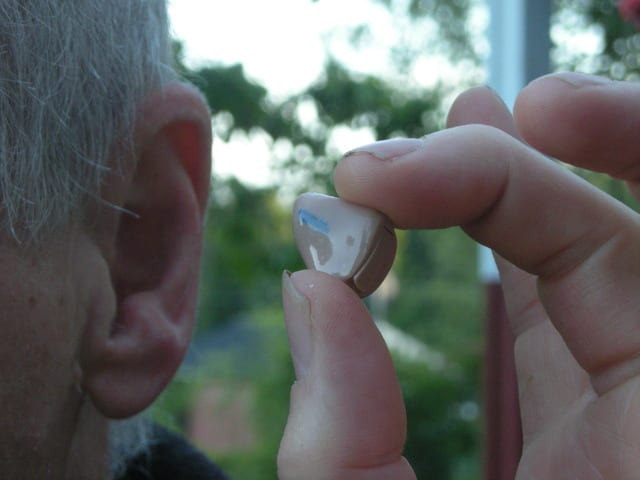“Dad! Dad!!”
“Huh, what?”
“Dad!!!!”
“WHAT!!!!!”
‘Turn off the turn signal!’
“Oh…”
I didn’t realize it at the time, but my kids yelling at me from the backseat was the first sign that I was suffering from real hearing loss. I would leave the turn signal on when switching lanes and everyone could hear the “dinging” but me.
I first noticed that it was becoming apparent to others in Nov. of 2014 while I was working in Buffalo. I kept saying to myself that I should go get a hearing test. But, I simply put it off.
I was constantly asking folks, “Say again?” and didn’t realize how much I was missing. Then about a year ago I actually asked our president if he wouldn’t mind sitting in the middle of the conference table for our weekly executive meetings so I had a better chance of hearing.
It was getting to the point where I simply could not ignore it any longer and finally scheduled an appointment with an audiologist.
In the end I went and had my hearing checked. I found out that I had lost almost 50 percent of my hearing.
My wife jokingly says it’s ‘referee’s revenge’ for all the years I spent giving the officials my perspective on their abilities when I coached. I would have to agree, but also said that my former players may think it was because of all the yelling I did on the ice at them!
Look, all kidding aside, this was hard. It was embarrassing to admit that I could not hear. Was it aging? Was it a tumor? Was it hereditary? Did I have a virus?
I contacted one of my former hockey players, Rich Filar, who is an expert in the industry and he steered me in the right direction. He was so reassuring that my quality of life would improve dramatically.
I visited Dr. Dick Faust at Centre Audiology and he and assistant Robin Cook took very good care of me.
I thought having Lasik surgery was as close to a miracle as I would ever get but found that getting my hearing aids was just as impactful.
I arrived home and my wife and kids had mixed feelings because they couldn’t talk behind my back and poke fun at me!
My wife said, “Well you can’t ignore me now!” To which I replied, “Of course I can! I will just say: Sorry guys my battery died, I didn’t hear ya!” Ha!
It has taken some time to get used to it and I will still from time to time forget to put them in. My wife had the kids tape reminders “GET YOUR HEARING AIDS” in the bathroom and even on my car dashboard because they see such a noticeable difference.
I just wish I had done this so much sooner, and so did my family!
All kidding, aside hearing loss truly is a national epidemic.
I wonder how many other people are ‘silently’ suffering and are not willing to talk about it from embarrassment or from a lack of understanding that there are options to living in silence. For some it is the stigma of having to wear hearing aids (in reality most people have no idea I have them unless I tell them), for others it is the financial concern because most insurance carriers don’t cover the devices or only reimburse a portion. It is considered “elective”. Really, overcoming hearing loss is “elective”?
There are safety issues for people who let their hearing loss go untreated whether at work or driving a car. Studies show that 60 percent of folks in the work force have some significant level of hearing loss.
My father-in-law Francis “Smitty” Smith has had a wonderful experience with the folks at Albrecht Audiology and I asked Dana Boddorf, PhD in Audiology, about this crisis and why more people don’t confront it and do something about it and chose to sit in silence.
Dana replied, “The perception is that hearing loss is something that happens due to aging. However, according to the NIDCD (National Institute on Deafness and other Communication Disorders), approximately 15 percent of Americans in the age group of 20 to 69 have a hearing loss due noise exposure, either from work or from recreational activities.”
She recommended that the best thing a person can do is to prevent hearing loss due to noise exposure from happening in the first place by using hearing protection devices when around loud sounds.
She went on to say, “Depression is a very common outcome of untreated hearing loss. Hearing loss leads to social isolation, which in turn, can lead to depression. Hearing loss has also been linked to dementia.’
In a study done at John Hopkins, a greater incidence of individuals with hearing loss was found to also have dementia. The hope is to find that earlier diagnosis and intervention, such as with amplification, will decrease the incidence of depression and dementia in those with hearing loss.
Dana also recommended a few links:
https://www.osha.gov/SLTC/noisehearingconservation/
http://www.hopkinsmedicine.org/news/media/releases/hearing_loss_and_dementia_linked_in_study
My quality of life has improved significantly since I “bit the bullet” and got my hearing checked. So I am reaching out to the “60 percent” out there who suspect they may be suffering form hearing loss and asking you to go get it checked. You may find a solution that is easy than you thought and affordable.
My final thought: I just wish I had done this so much sooner.



